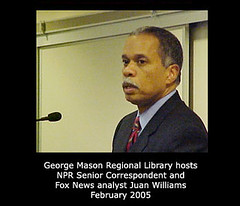 Image by Fairfax County Public Library via Flickr
Image by Fairfax County Public Library via FlickrThere is no need to repeat the recent media news of National Public Radio-NPR-firing political analyst Juan Williams for expressing a certain personal view about Muslim attire aboard airplanes (Muslim terrorists and planes being joined in the acts of 9/11). Mr. Williams expressed personal feelings that do not conform to the NPR image. The lack of conformity was the problem. Mr. Williams made it clear that he was speaking only of the iconic effect of Muslim garb plus airplanes, an effect that remains in the American experience. Nevertheless, he did not conform his reactions to the expressed ideals of NPR, it is now clear.
There is no need to put up a shield of words to defend Mr. Williams here, for Mr. Williams fights verbally very well. In fact, in the context of his remarks about airplanes and garb on Fox News, he said that his feelings are not directed toward all Muslims. The larger story that NPR exposed is its intolerance of Mr. Williams' personal expression, then exacerbated the situation by its leader's efforts to stigmatize Mr. Williams.
That is one part of the big story, that NPR leadership claims tolerance and yet behaves intolerantly--grossly so. The other part of the big story here is that the leader of NPR used a tactic often used by those of extremist views, by any name, to put down anyone who does not agree: to stigmatize critics. When the leader of NPR referred to Mr. Williams taking up his views with "his psychiatrist or his publicist," she employed that tactic of stigmatization.
There is personal relief that the effort was seen for what it was, by all who still maintain, in the public forum, that every citizen of a free society has the right to express personal views. The intolerance of NPR management in this instance caused the closing, even the slamming, of their open door... on a respected journalist and commentator.
(c) Jean Purcell








